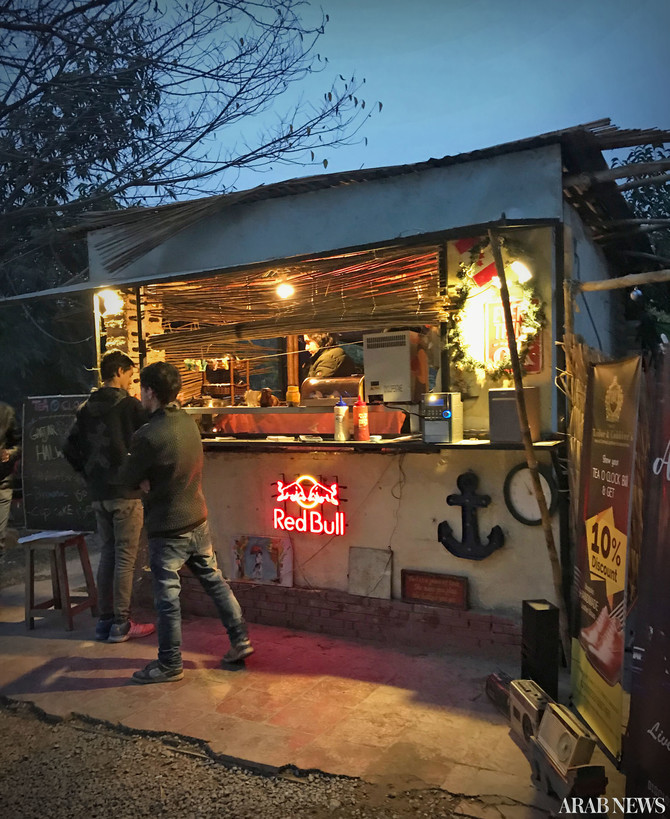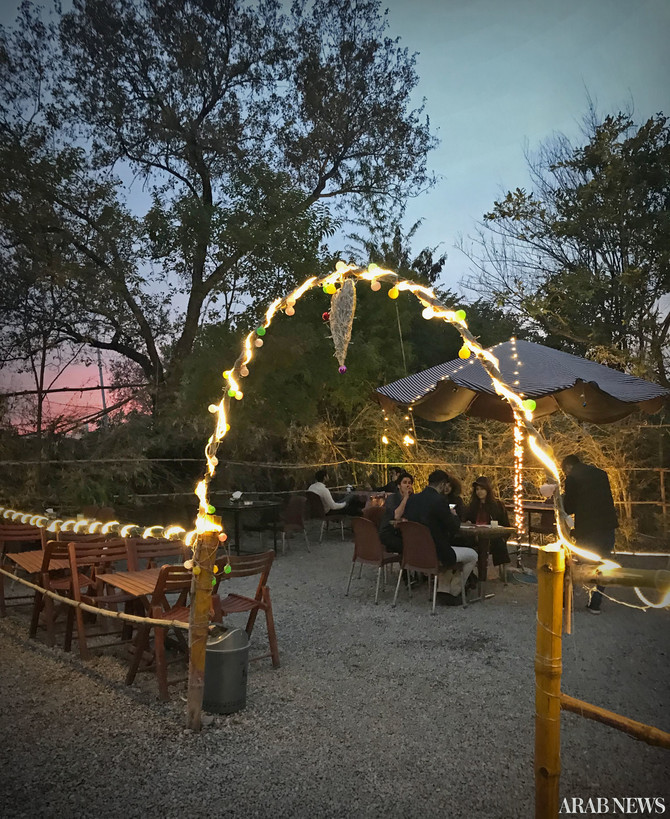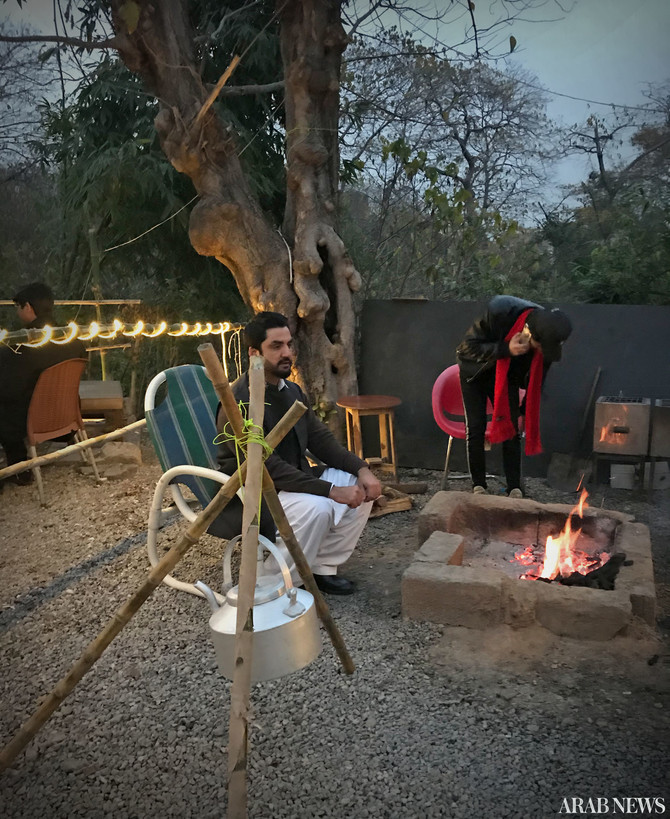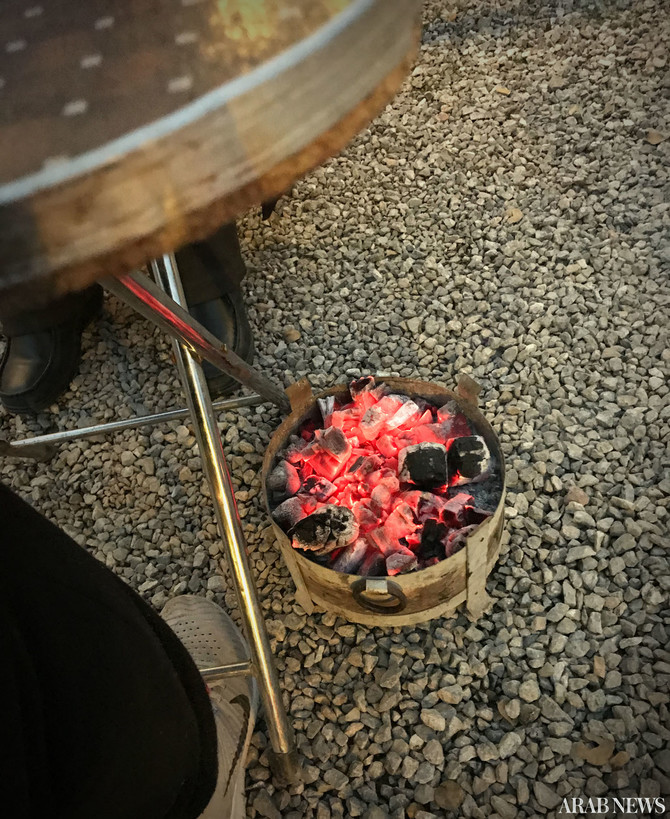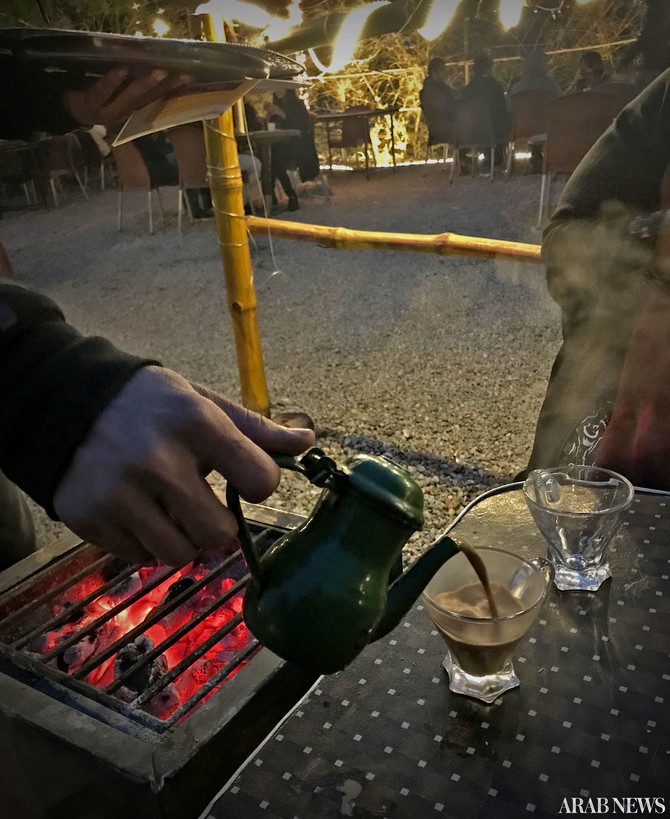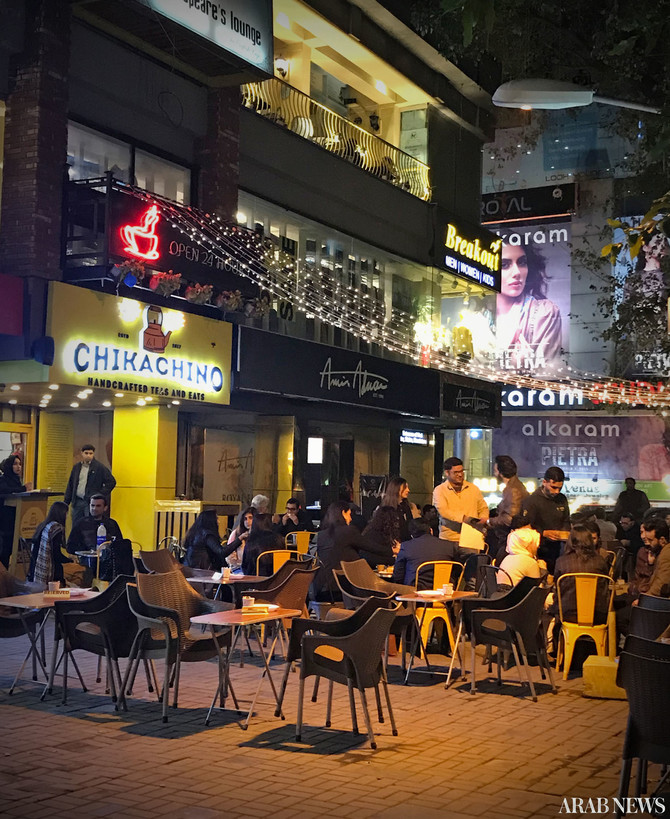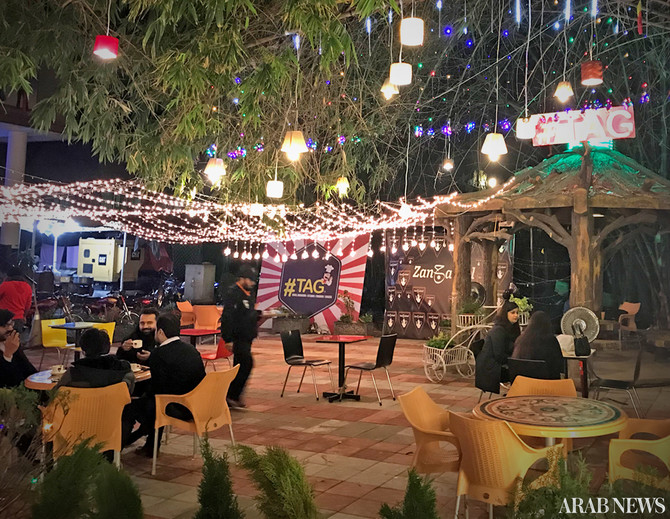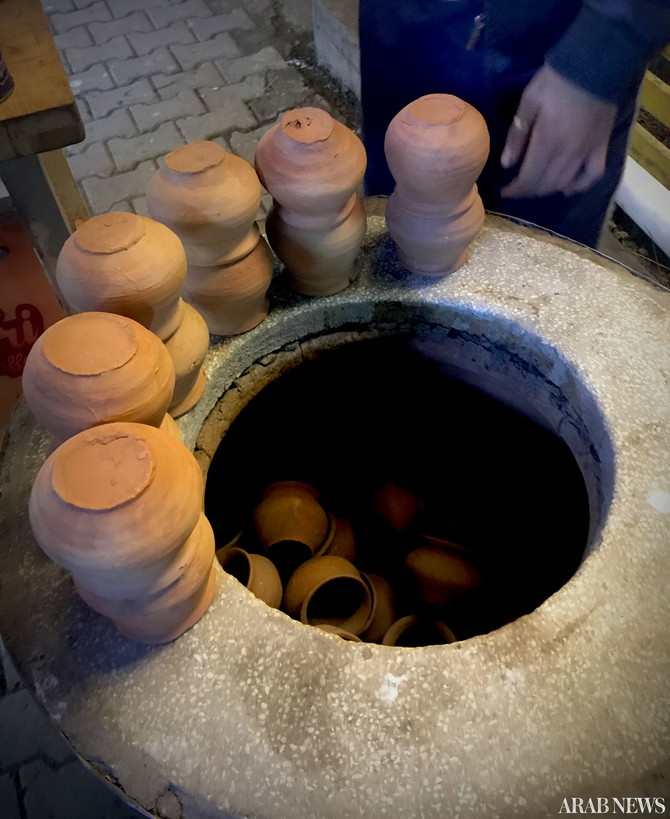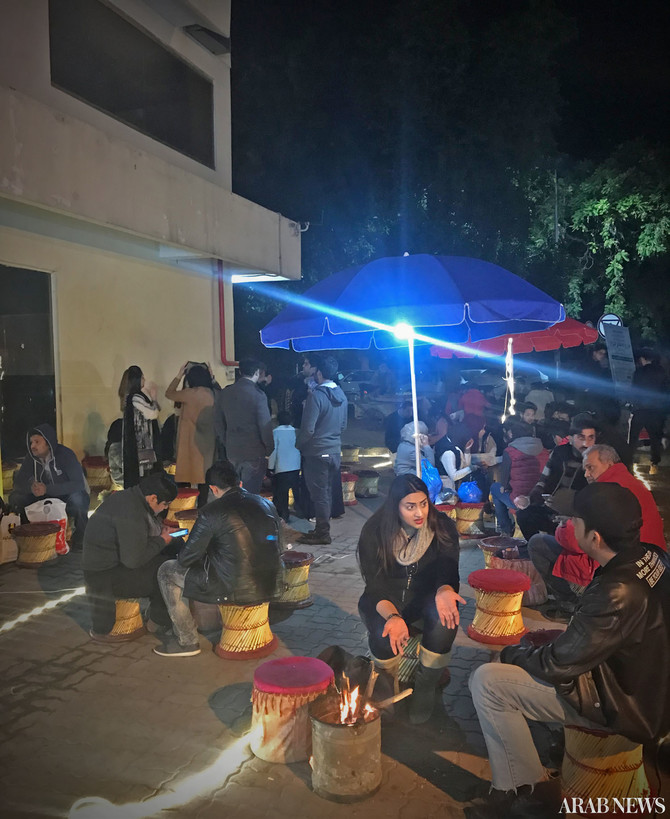ISLAMABAD: Fairy lights sparkle on trees at a sharp bend in a corner of Islamabad’s upscale Jinnah Market. A stretch of road that was just unattended brush not too long ago now has lines of cars parked along it. A wooden cutout of a teapot announces a new addition to Islamabad’s chai scene: ‘Tea O’ Clock.’ Beyond this is a humble little shack where young people sit snugly on colorful chairs around small tables sipping steaming cups of tea.
The scene looks like a still from an early 90’s film centered on a group of teens sharing the simple joys of living and forming life-long friendships around a milky elixir of black tea laced with cinnamon, cardamom and cloves. Coal-filled grills provide the necessary relief from Islamabad’s biting chill. On one table, three girls sing old Bollywood songs; on another, a game of Monopoly is in its final moments; on yet another, a group of young boys and girls discuss the semantic features of Urdu poetry.
Tea O’ Clock is one of five back-to-basics chai shops that have opened up in the upmarket F7 neighborhood recently, all steeped in nostalgia, with simple and unfussy menus aimed at giving the capital’s youth an option other than pricey restaurants and cafes.
“The response has been overwhelming, we are always crowded and it was surprising,” Tea O’ Clock owner Imran Khan told Arab News. “Even in the cold where I find it so difficult to sit out, it’s always full.”
“It sort of proves people needed a place like this.”
Khan opened up the chai shop on the unassuming strip of land about a year ago so he could have a place to sit, work and relax which wasn’t an upscale cafe or restaurant.
“I made something for myself which was not very fancy,” Khan said. “And it turned out to be very successful.”
“The youth here, the young crowd, they don’t have much today to do, honestly. All we have is restaurants where you go eat and have to leave,” Khan said as he warmed his hands on a coal heater. “There’s nothing, no place where you can sit for an hour for something social and casual to do.”
He said people came to his chai shop to do office work, play cards, just chat with friends “all over a simple cup of tea.”
Last year, Chik-a-Chinos started a revolution in Islamabad’s restaurant world as an outdoor cafe with (comparatively) low prices, street eats and, yes, chai.
Quetta Tea ‘n Teas in F10, and it’s sister restaurant, an outdoor dhaba style cafe called #TAG, also opened in F7, both focusing on chais from Quetta and eats to match. Previously home to cellphone stores, an entire strip of the F7 market now boosts of chai vendors that sell a simple cup of tea in a single-serving sized matka, or clay pot.
The largest of these is Tandoor Junction, sitting on the sidewalk of the corner of Jinnah Market. The menu is simple: six different variations of chai.
“We come and sit here because it’s just easy,” said Javaid Malik, 30, who was at Tandoor Junction with a larger group of friends. “You don’t always want to be in a restaurant, paying a ton of money. This feels more free.”
Another patron, Nida Aziz, said at Quetta Tea ‘n Teas: “I like that I can leave work, come here, easily meet up with other friends and finally have a place outside of home and restaurants to have a conversation. That’s what’s really been lacking here: a place you can go and talk like when we were kids in school.”
In Pakistan’s upscale capital, a new tea culture blossoms
In Pakistan’s upscale capital, a new tea culture blossoms

- ‘Tea O’ Clock’ is the newest entrant in Islamabad’s growing chai scene
- Authentic chai cafes replace pricey restaurants as options for the city’s youth
Pakistan PM directs task force to propose budget plan for low-cost housing

- Pakistan faces a housing crisis, with the shortage particularly acute in urban areas
- PM says ahead of the budget low-cost housing is his administration’s top priority
ISLAMABAD: Prime Minister Shehbaz Sharif said on Wednesday his administration is prioritizing the development of low-cost housing while directing a task force to present financing recommendations to include the facility in the upcoming budget.
Pakistan has been facing a housing crisis, with the World Bank suggesting two years ago it was short of an estimated 10 million housing units. The shortage is particularly acute in urban areas due to rapid population growth, unregulated expansion and high land and construction prices.
The federal budget, which will be presented to the National Assembly next month, is expected to outline measures to tackle the crisis as the new fiscal year begins in July.
“The government’s foremost priority is to facilitate access to housing through low-cost schemes,” Sharif said during a task force meeting to address the issue.
“Such projects will not only make residential units accessible to the common man but also stimulate economic growth and create employment opportunities,” he continued.
The prime minister instructed the task force to work with the finance ministry and banks to prepare detailed financing proposals for affordable housing, with the aim of making them part of the upcoming budget.
He also emphasized that developing the construction sector was key to sustainable economic growth.
Officials briefed the prime minister on ongoing reforms to the Condominium Act 2025 and Foreclosure Law, saying they were in their final stages and were expected to ease access to housing loans under the new schemes.
Pakistan says India using ‘terrorism’ as foreign policy tool after school bus attack in Balochistan

- New Delhi rejects Pakistan’s allegation, calls it an attempt to deflect responsibility for internal failures
- PM Sharif visits Balochistan after school bus bombing kills three children, leaves eight critically wounded
KARACHI: Pakistan urged the international community on Wednesday to condemn what it called India’s use of “terrorism” as a foreign policy tool, after a vehicle-borne improvised explosive device targeted a school bus in the southwestern Balochistan province, killing at least three children and injuring 39 others, including eight critically.
Balochistan, Pakistan’s largest province by landmass and rich in mineral resources, has long faced an insurgency led by separatist groups who accuse Islamabad of exploiting local resources while neglecting the population. The government denies the claims, citing investments in health, education and infrastructure.
In recent months, the insurgency has intensified, with groups like the Balochistan Liberation Army (BLA) carrying out high-casualty attacks on civilians and security forces, including taking hostages at a passenger train. Pakistan says it has evidence linking India to these attacks, though New Delhi has denied involvement and distanced itself from the Khuzdar school bombing.
However, Islamabad described the attack as a “sequel” to India’s missile and drone strikes earlier this month, accusing New Delhi of deploying militant proxies to destabilize the country, as Prime Minister Shehbaz Sharif and Field Marshal Asim Munir visited the region to meet injured children in hospital.
“These terrorist groups — masquerading under ethnic pretenses — are not only being exploited by India as instruments of state policy, but also stand as a stain on the honor and values of the Baloch and Pashtun people, who have long rejected violence and extremism,” said a statement issued by the PM Office after Sharif’s visit to Quetta.

“India’s reliance on such morally indefensible tactics, particularly the deliberate targeting of children, demands urgent attention from the international community,” it added. “The use of terrorism as a tool of foreign policy must be unequivocally condemned and confronted.”
The prime minister and the accompanying delegation was briefed by Balochistan’s Chief Minister Sardar Sarfraz Bugti and local military officials on the attack, which also killed two soldiers and injured 53 people in total.
The official statement said Pakistan’s security forces and law enforcement agencies “will relentlessly pursue all those involved in this barbaric act,” vowing to bring “the architects, abettors and enablers of this crime” to justice.
It added the incident had exposed India’s “cunning role” to the world, revealing how it orchestrated militant violence while simultaneously portraying itself as a victim.
India’s Ministry of External Affairs earlier in the day rejected Pakistan’s allegations, describing them as Islamabad’s attempt to deflect responsibility for its own failings and internal issues.
The latest attack follows a brief military standoff between the two countries earlier this month, which ended in a ceasefire on May 10.
While hostilities along the border have subsided, both sides continue to trade diplomatic barbs, accusing each other of sponsoring terrorism and destabilizing the region.

The attack in Khuzdar, which targeted children en route to an army-run school, was condemned by US Chargé d’Affaires Natalie Baker and UNICEF in separate statements.
It was also reminiscent of one of the deadliest militant attacks in Pakistan’s history when over 130 children were killed in a military school in the northern city of Peshawar in 2014. That attack was claimed by the Pakistani Taliban group.
India expels second Pakistani diplomat amid ongoing tensions

- India declares Pakistani diplomat persona non grata, orders him to leave the country within 24 hours
- India expelled another Pakistani diplomat on May 13, prompting a tit-for-tat response from Islamabad
ISLAMABAD: India has expelled a second Pakistani diplomat within ten days, declaring him persona non grata for activities “not in keeping with his official status,” the external affairs ministry in New Delhi announced on Wednesday.
The move comes amid heightened tensions between the two countries following a military standoff earlier this month. Despite a ceasefire agreement reached on May 10, diplomatic relations between the nuclear-armed neighbors remain strained.
“The Government of India has declared a Pakistani official, working at the Pakistan High Commission in New Delhi, persona non grata for indulging in activities not in keeping with his official status in India,” the Indian ministry said in its statement.
“The official has been asked to leave India within 24 hours,” it added.
This is the second such expulsion in recent weeks. On May 13, India expelled a Pakistani diplomat on similar grounds. In response, Pakistan declared an Indian High Commission staffer in Islamabad persona non grata.
The Indian ministry also summoned the Charge d’Affaires of the Pakistan High Commission to issue a demarche, emphasizing that Pakistani diplomats must not “misuse their privileges and status in any manner.”
As of now, Pakistan’s foreign office has not responded to the latest development.
Pakistan’s health minister assures Palestinian counterpart of medical support

- Syed Mustafa Kamal meets Dr. Maged Abu Ramadan at the World Health Assembly in Switzerland
- Israel has repeatedly targeted hospitals and health workers in Gaza, causing international concern
ISLAMABAD: Pakistan’s health minister Syed Mustafa Kamal informed his Palestinian counterpart that a framework has been developed to provide medical assistance to the people of Gaza, according to an official statement on Wednesday, during a meeting on the sidelines of the 78th World Health Assembly in Switzerland.
Kamal’s meeting with the Palestinian health minister, Dr. Maged Awni Muhammad Abu Ramadan, took place at a time when Israeli forces have repeatedly targeted hospitals and health facilities in Gaza, crippling the enclave’s health care system.
Israeli attacks have also led to international concern over violations of humanitarian norms in the war-torn Palestinian territory.
“We stand with our Palestinian brothers and will provide all possible medical support to heal their wounds,” the health ministry quoted Kamal as saying.
He strongly condemned Israel’s targeting of hospitals and health care workers, urging the international community to take concrete action to end the atrocities against Palestinians, including women and children.
“The brutality and oppression must stop,” he was quoted as saying. “The world must hold Israel accountable.”
Earlier this week, Pakistan condemned Israel’s targeting of hospitals in Gaza and described its announcement of taking control of the entire Palestinian territory as a “grave threat” to regional peace.
The remarks by the Pakistani foreign office came after Israeli Prime Minister Benjamin Netanyahu declared his government wanted to take control of the Gaza Strip.
Pakistani military blames ‘Indian-sponsored’ militants for children’s death in northwest this week

- Protests broke out in North Waziristan after a suspected drone strike reportedly led to the killings of four children
- The military says initial investigations have revealed the incident was carried out by ‘Fitna Al Khwarij’ militants
ISLAMABAD: Pakistan’s military on Wednesday denied responsibility for the death of four children in North Waziristan earlier this week, attributing the incident to a proscribed militant network which it said was operating on “the behest of their Indian masters.”
The incident occurred on May 19 in the Hurmuz village of Mir Ali tehsil, where a suspected drone strike reportedly led to the death of four children from the same family and injuries to five others, including a woman.
The tragedy sparked protests in the area, with locals staging a sit-in and refusing to bury the deceased until authorities provided clarity on the incident and ensured accountability for the loss of innocent lives.
In a statement released on Wednesday, the Inter-Services Public Relations (ISPR), the military’s media wing, dismissed allegations implicating Pakistan’s security forces in the strike, labeling the accusations as “entirely baseless” and part of a “coordinated disinformation campaign” aimed at discrediting the military’s counterterrorism efforts.
“Initial findings have established that this heinous act has been orchestrated and executed by Indian-sponsored Fitna Al Khwarij,” the statement said, using a term commonly employed by Pakistani authorities to describe extremist factions like the Tehreek-i-Taliban Pakistan (TTP).
The term “khwarij” is rooted in early Islamic history and refers to an extremist sect that declared other Muslims apostates.
“It is evident that these elements — acting at the behest of their Indian Masters — continue to exploit civilian areas and vulnerable populations as shields to conduct their reprehensible acts of terrorism,” the statement added. “Such tactics aims to unsuccessfully sow discord between the local population and the security forces, who together remain resolute to uproot the menace of terrorism.”
The military also reaffirmed its commitment to bringing the perpetrators to justice, emphasizing its ongoing efforts to combat militant violence in the region.


